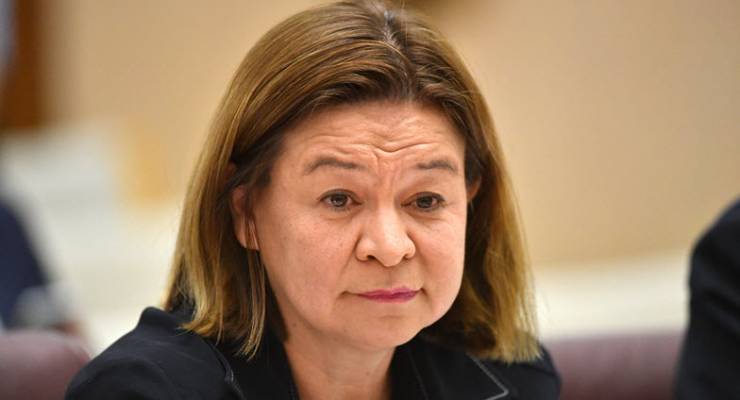
The ABC board’s abrupt decision to fire managing director Michelle Guthrie halfway through her five-year term on Monday left many scratching their heads. In a statement laden with euphemism and vagaries, the board remained frustratingly coy about the reasons for removing the former managing director, claiming it was “not in the best interests of the ABC” for Guthrie’s tenure to continue.
“In resolving to seek fresh leadership, the board’s foremost consideration was the long-term interest of our own people and the millions of Australians who engage in ABC content every week,” ABC chairman Justin Milne said.
But journalists and media law experts believe the ABC board may well have been muzzled by the spectre of litigation. According to Professor Barbara McDonald, an academic at the University of Sydney, Milne’s cautiously worded statement is yet another troubling illustration of how Australia’s “restrictive” defamation laws can have a chilling effect on important public discourse.
“Undoubtedly our laws are too restrictive, and if the chair of the ABC can’t safely give the public an explanation [about Guthrie’s firing], that is obviously problematic,” she told Crikey.

‘Reputation over freedom of speech’
Australia’s defamation laws are infamously more favourable to plaintiffs than any analogous jurisdiction. In the United States, for example, defamation laws have been shaped by the right to freedom of speech enshrined in the first amendment to the constitution. According to McDonald, this means it’s “it’s virtually impossible to sue for libel, especially if you’re a public figure, like Guthrie”.
Similarly, the UK recently weakened its defamation laws to include the requirement that a plaintiff can only sue where there is a likelihood of serious harm.
In Australia, on the other hand, a key stumbling block in making any public statement that has the potential to damage someone’s reputation has been that the defendant (rather than the plaintiff) bears the onus of establishing that the statement is true on the balance of probabilities. The difficulties of establishing a truth defence for any hypothetical negative statements on Guthrie’s abilities or actions may have influenced the deliberate and sparse statement provided by Milne.
“The reality is that … [Australia] has tended to protect reputation over freedom of speech,” Professor David Rolph told Crikey, a specialist in media law also from the University of Sydney.
But what about public interest?
There is, of course, considerable public curiosity about the board’s decision. But the public’s right to know about the workings of the ABC is not enough to shield a communication from defamation proceedings.
“One of the difficulties in publishing in Australia is there’s no broad-based public interest defence,” said Rolph.
While the UK, Canada, and most recently New Zealand have all beefed up their “public interest” defences to defamation, such a defence does not exist in Australia. Instead, we have a defence of “qualified privilege”, which arises where the person making a communication has a legal, social or moral duty in making it to a person with a reciprocal interest in receiving it. In an employment context, for example, a reference provided by a former employer might be protected by qualified privilege.
However, this defence is unlikely to cover a communication, such as the board’s statement, which is made to the broader public. Generally, courts have interpreted qualified privilege to require a relationship of complete reciprocity between the publisher and recipient. According to Rolph, this means that “there’s no defence where the publication is to the world at large”.
The result is that anyone making a communication to the general public must be relatively careful with their language.
“We’re all interested in knowing why Guthrie was sacked, but it’s very difficult for defendants to rely on qualified privilege. That’s why Milne was very cautious,” McDonald said.
Guthrie’s sacking comes at a time where Australia’s defamation laws are under considerable scrutiny. While the Me Too movement has seen a raft of allegations made against powerful men in the US, Australia’s own “Weinstein moment” has arguably been stifled by the threat of lawsuits.
“Again and again, we see how restrictive our defamation laws are,” McDonald said. “Obviously we need some protection [for reputation] under the law, however there should be situations where people can speak freely.”
In this context, Rolph believes it is time for Australian courts to develop a public interest defence. “There is scope for reform, and other jurisdictions have demonstrated that.”
What do you think of the state of Australia’s defamation laws? Let us know at boss@crikey.com.au.








Remarkable that an email to Michelle Guthrie from Milne, that is said to prove wrong doing, only surfaces a few days after Michele is fired by Milne.
Sounds just like the excuses made for not making public the reasons for nobbling Bernard Collaery and Witness K.
An organisation comprising news reporters? I think that we will get all the dirt in due course, possible just not by traditional means. Hook yourself up on twitter and you will get the goss.
Politicians and public figures should only be able to sue for a retraction or an apology. Nor for cash compensation
So is it still the case that, the greater the truth the greater the libel?